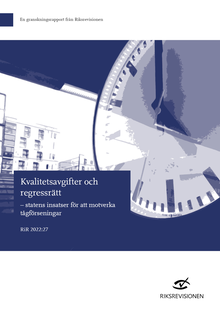Measures against train delays are inadequate
Delay charges and right of recourse were introduced to counteract delays in railway traffic. The Swedish National Audit Office’s audit shows that, despite this, the number of delays has not decreased overall, and that this is in part due to deficiencies in the design of the policy instruments.

Photo: Johan Alp
To reduce disturbances in railway traffic, the Government and the Riksdag have introduced two new policy instruments – delay charges and right of recourse*. The Swedish National Audit Office (Swedish NAO) has examined whether the policy instruments work as intended. The overall conclusion is that they lack certain conditions to be able to effectively counteract train delays.
“At an overall level, delay charges and right of recourse have not significantly reduced the problems of delays – neither those caused by railway undertakings’ shortcomings nor those caused by errors in operations management or the railway infrastructure,” says Auditor General Helena Lindberg.
The Swedish NAO has identified a number of deficiencies in the construction and application of both systems. For example, the delay charges have not been based on sufficiently qualified analyses of how they will lead to fewer delays.
The deficiencies have also resulted in disproportionately large administrative costs for the right of recourse system in relation to the compensation payments, and not the most effective use of planning, prioritisation and implementation of preventive measures.
The audit also shows that the right of recourse only compensates freight operators for a minor part of the costs in the event of delays and that the extensive manual handling required in the system in some cases means that applying for compensation is not attractive economically for the railway undertakings.
In addition, there are no effective incentive structures within the Swedish Transport Administration since the costs of the delays are not charged to the areas of operation responsible for the deficiencies.
“The delay charges are designed more favourably for railway undertakings than for the Swedish Transport Administration, which means that the Swedish Transport Administration pays more even though they cause fewer delays. This is in part because the Swedish Transport Administration pays for all its delays, while the railway undertakings do not pay for their consequential delays,” says Sherzod Yarmukhamedov, Project Leader for the audit.
Recommendations in brief
The recommendation to the Government is to follow up and review the cost effectiveness and steering effect of the right of recourse system. If there are no prospects for improvement, then the Government should consider proposing to the Riksdag to discontinue the right of recourse system for domestic traffic.
The recommendations to the Swedish Transport Administration include performing an analysis to identify the most efficient level of punctuality for the railway undertakings. This analysis should serve as a basis for designing the structures and levels of the delay charges in order to provide the actors with sufficient incentives to reduce disturbances.
The Swedish Transport Administration should also develop methods and practices for registering delay codes for the railway undertakings’ consequential delays and produce a plan for introducing delay charges for the railway undertakings’ consequential delays.
See the report for the full recommendations.
* Delay charges and right of recourse
The delay charges involve the party (for example an infrastructure manager) that causes a delay to pay a charge to the other party (for example a railway undertaking).
The right of recourse complements the delay charge and involves railway undertakings being able to demand compensation for their (and their customers’) additional costs when an infrastructure manager causes a delay.
Press contact: Olle Castelius, phone: +46 8-5171 40 04.
Dela i sociala medier och via e-post
Kontakta oss
Skicka dina frågor eller synpunkter via formuläret nedan så ser vi till att de når rätt handläggare. Ange gärna om din fråga har att göra med informationen på just den här sidan. Genom att skicka in en fråga till oss medger du behandling av dina personuppgifter i enlighet med EU:s dataskyddsförordning (GDPR).


